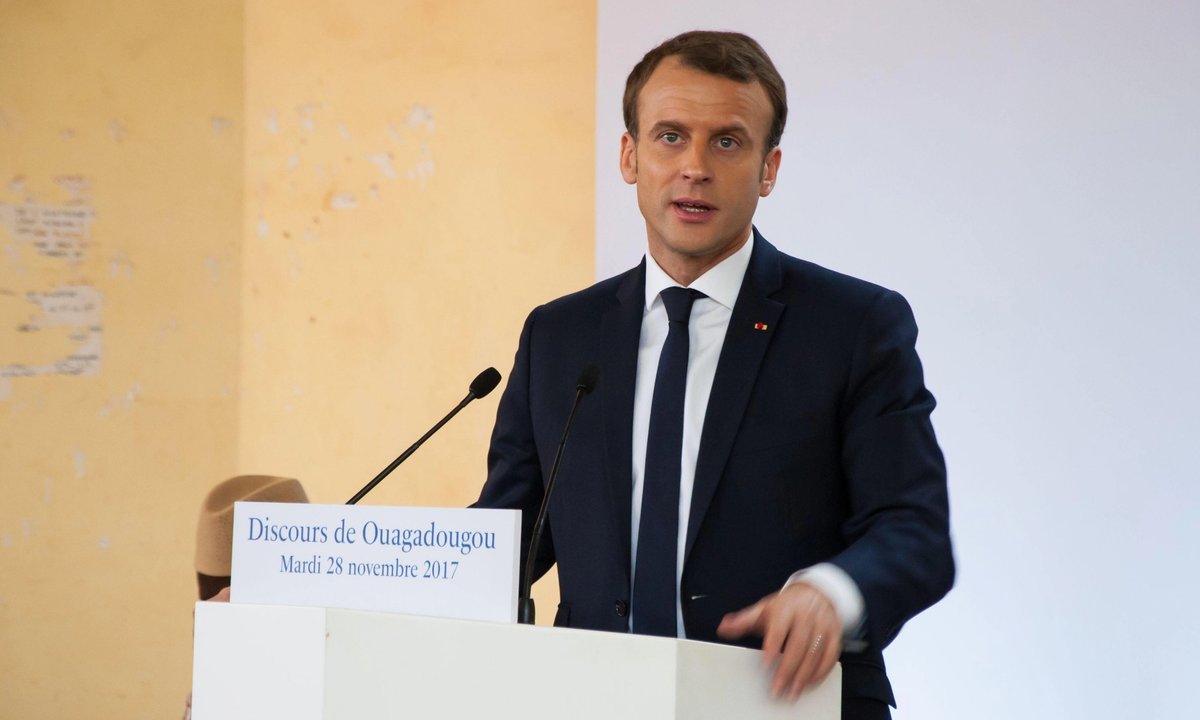President Emmanuel Macron delivering a speech at the University of Ouagadougou in Burkina Faso in November 2017, during which he discussed the return of African heritage from European collections
Guillaume Destombes / Alamy Stock Photo
It is seven years tomorrow (28 November) since President Emmanuel Macron of France announced his revolutionary plan to return African heritage to the continent. His declaration in Burkina Faso in November 2017 that “African heritage can’t just be in European private collections and museums” reignited the debate around the restitution of colonial artefacts.
But following Macron’s historic declaration, the restitution journey has been arduous. In January 2022, France’s senate approved a bill—proposed by senators Catherine Morin-Desailly, Max Brisson and Pierre Ouzoulias—to set up a national expert commission that would be consulted on any future non-European restitution cases.
The draft bill also proposed a law facilitating the restitution of human remains held in French public collections, and this was adopted last December.
In June 2023, the National Assembly also voted unanimously to adopt a new law that allows public institutions to return Nazi-looted objects in their collections. This process has been further by other developments, such as the publication of guidelines for returning objects looted from former colonies and during the Nazi period in a report written by the former Louvre director Jean-Luc Martinez.
But no date has yet been fixed for a bill on colonial items, the third part of the senators’ aforementioned proposal, to be debated in the National Assembly. “The third framework law on the restitution of colonial spoliations was to be submitted to parliament in the spring of this year,” Ouzoulias tells The Art Newspaper.
He adds that efforts have stalled in the wake of political tumult sparked by Macron’s decision to call snap parliamentary elections in June. “The dissolution [of the government during the election] interrupted this schedule.”
However, an important object from the Ivory Coast housed at the Musée Quai Branly-Jacques Chirac in Paris will be returned to its native country. Earlier this month, the Djidji Ayôkwé drum—used by the Ébrié community to warn against danger—was transferred to the Ivorian government.
“This is a historic day for Côte d'Ivoire!" said Françoise Remarck, the Ivorian minister of culture, at a signing ceremony on 18 November at the French ministry of culture. The drum, seized by French forces in 1916, was on a list of 148 works that the Ivory Coast officially requested at the end of 2018 to be returned by France.
A ministry statement says: “The ministers proceeded with a joint signing of an agreement for the deposit of the ‘talking drum’ known as Djidji Ayôkwé kept in the national collections… as well as the signing of a partnership agreement between the French Republic and the Republic of Côte d'Ivoire relating to heritage and museum cooperation.”
But the drum is the latest in a trickle, rather than a flood, of restitutions. France previously repatriated a 19th-century sabre to Senegal and 26 items to Benin. The country has also returned the crown of Madagascar’s last queen, Ranavalona III, as a long-term loan from France’s Army Museum via diplomatic channels, bypassing parliament.
“The delay in voting on the framework restitution law therefore required the government to act urgently and organise the transfer of the drum by means of a deposit agreement which is an administrative decision that does not require a vote by parliament,” Ouzoulias says. “However, the Senate culture committee wanted this deposit to be formalised by a specific law that would allow the drum to be returned in full ownership. A bill was tabled for this purpose.”
Rachida Dati, the French culture minister, told the French publication Le Quotidien de l’Art: “Restitutions have been taboo for too long. But it is a subject on which we must not give up. That is why, in order to speed up things, I preferred to opt for a two-stage solution [with the drum]: a deposit agreement then a law on the transfer of ownership.”
An anonymous French journalist tracking the developments says: “Macron promised to restitute the drum in 2021. But since then, we have been waiting for a law organising such restitutions, which has not yet been submitted to parliament so the drum can only be transferred to the Côte d'Ivoire on the basis of a long-term loan. In other words, France continues to apply a policy of restitutions bit-by-bit, against the backdrop of its diplomatic interests.”
Ouzoulias adds: “Rima Abdul Malak, the previous culture minister, had been very active on the restitution file, which had allowed for important work with the senate. The current minister has not shown the same enthusiasm. Since the beginning of the year, the ministry of culture has done very little work on this file. The diplomatic pressure exerted by several African states forced it to get involved.”

